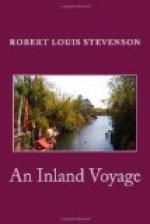When the young man was gone, we countermanded our candles, and ordered some brandy and water. The great billows had gone over our head. The Royal Nautical Sportsmen were as nice young fellows as a man would wish to see, but they were a trifle too young and a thought too nautical for us. We began to see that we were old and cynical; we liked ease and the agreeable rambling of the human mind about this and the other subject; we did not want to disgrace our native land by messing an eight, or toiling pitifully in the wake of the champion canoeist. In short, we had recourse to flight. It seemed ungrateful, but we tried to make that good on a card loaded with sincere compliments. And indeed it was no time for scruples; we seemed to feel the hot breath of the champion on our necks.
AT MAUBEUGE
Partly from the terror we had of our good friends the Royal Nauticals, partly from the fact that there were no fewer than fifty-five locks between Brussels and Charleroi, we concluded that we should travel by train across the frontier, boats and all. Fifty-five locks in a day’s journey was pretty well tantamount to trudging the whole distance on foot, with the canoes upon our shoulders, an object of astonishment to the trees on the canal side, and of honest derision to all right-thinking children.
To pass the frontier, even in a train, is a difficult matter for the Arethusa. He is somehow or other a marked man for the official eye. Wherever he journeys, there are the officers gathered together. Treaties are solemnly signed, foreign ministers, ambassadors, and consuls sit throned in state from China to Peru, and the Union Jack flutters on all the winds of heaven. Under these safeguards, portly clergymen, school-mistresses, gentlemen in grey tweed suits, and all the ruck and rabble of British touristry pour unhindered, Murray in hand, over the railways of the Continent, and yet the slim person of the Arethusa is taken in the meshes, while these great fish go on their way rejoicing. If he travels without a passport, he is cast, without any figure about the matter, into noisome dungeons: if his papers are in order, he is suffered to go his way indeed, but not until he has been humiliated by a general incredulity. He is a born British subject, yet he has never succeeded in persuading a single official of his nationality. He flatters himself he is indifferent honest; yet he is rarely taken for anything better than a spy, and there is no absurd and disreputable means of livelihood but has been attributed to him in some heat of official or popular distrust. . . .
For the life of me I cannot understand it. I too have been knolled to church, and sat at good men’s feasts; but I bear no mark of it. I am as strange as a Jack Indian to their official spectacles. I might come from any part of the globe, it seems, except from where I do. My ancestors have laboured in vain, and the glorious Constitution cannot protect me in my walks abroad. It is a great thing, believe me, to present a good normal type of the nation you belong to.




